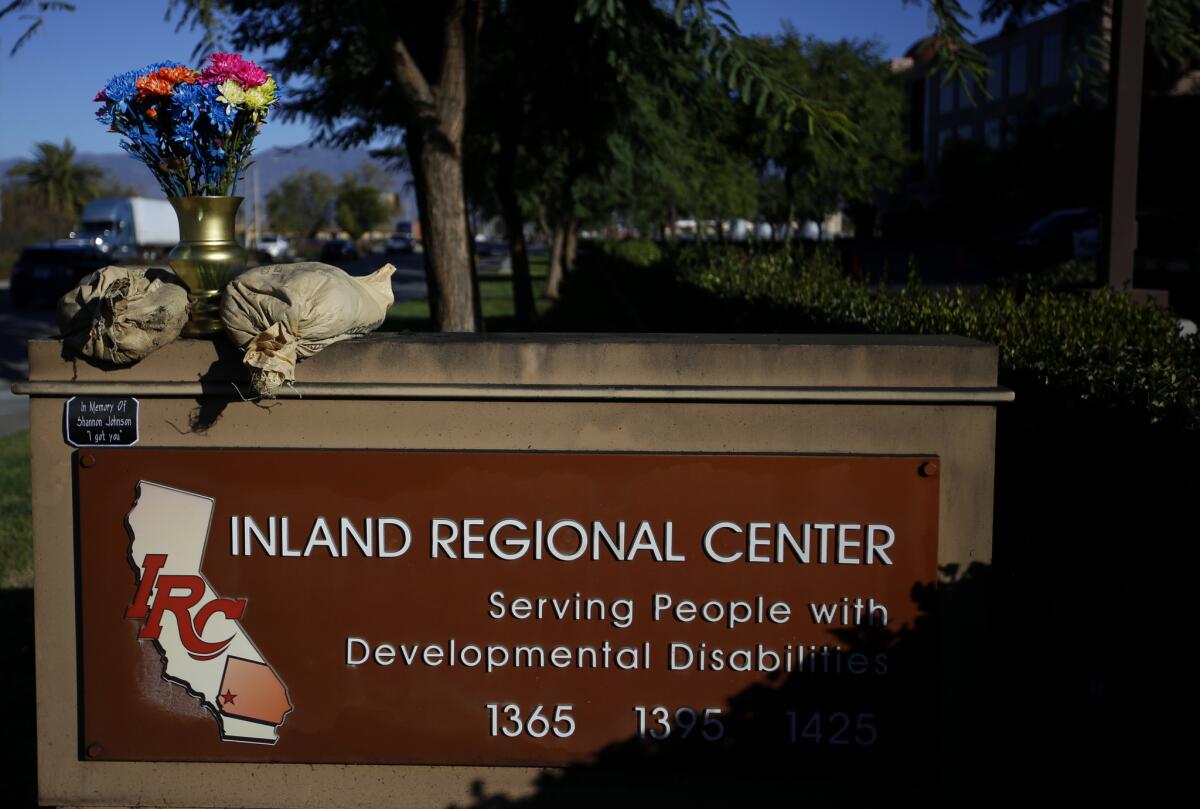Families of San Bernardino attack victims accuse Facebook, Google and Twitter of aiding terrorism in lawsuit

- Share via
Relatives of the victims of the San Bernardino terrorist attack filed a federal lawsuit Wednesday against Twitter, Google and Facebook, accusing the tech giants of knowingly supporting Islamic State and its extremist agenda.
The lawsuit filed in U.S. District Court for the Southern District of California contends the three companies have allowed Islamic State to build an outsize online presence and propagate its extremist beliefs, drawing recruits and promoting attacks such as the Dec. 2, 2015, shooting at the Inland Regional Center.
The attack by Syed Rizwan Farook and his wife, Tashfeen Malik, left 14 people dead, including Sierra Clayborn, Tin Nguyen and Nicholas Thalasinos, whose family members filed the suit. Twenty-two others were injured in the shooting.
The family members say in their lawsuit that the social media companies’ platforms amounted to material support to Islamic State and that the online content posted there fueled the radicalization of Malik and Farook.
“Even if Farook and Malik had never been directly in contact with ISIS, ISIS’ use of social media directly influenced their actions on the day of the San Bernadino massacre,” the lawsuit states, using an acronym for Islamic State.
“Without defendants Twitter, Facebook and Google (YouTube), the explosive growth of ISIS over the last few years into the most feared terrorist group in the world would not have been possible,” the suit says.
The suit contends the companies are liable for aiding and abetting acts of international terrorism, wrongful death and providing support to a designated foreign terror group, among other claims.
Spokespersons for Twitter, Facebook and Google could not be reached for comment.
Across the U.S., similar lawsuits against social-networking companies have been dismissed by courts because of the Communications Decency Act, which immunizes online providers from liability over user postings.
The lawyers representing the victims’ families have filed lawsuits with nearly identical accusations against social media companies on behalf of the victims in the massacre at the Pulse nightclub in Orlando, Fla., and the father of a Cal State Long Beach student who was killed in a terrorist attack in Paris.
In these cases, Google, Facebook and Twitter have said in court papers that they are sympathetic to victims of such heinous events but are not liable for what happened.
In a bid to dismiss the Pulse lawsuit in court papers filed Friday, the tech giants argued that the victims’ families relied on a tenuous and speculative chain of events to cast blame on social media for the Orlando gunman’s self-radicalization.
The companies stated that accepting such an “unbounded theory” of the Orlando nightclub massacre “would have staggering consequences, exposing every online platform to possible liability for terrorist violence anywhere in the world, at any time, simply because terrorists who committed the attack may have been loosely affiliated with some of the platforms’ billions of users.”
Shortly after the San Bernardino massacre, FBI Director James B. Comey said there was no evidence that the couple was directed by a larger terror network, although there were signs of “potential inspiration by foreign terrorist organizations.”
“The Internet allows the opportunity for people to consume poison and radicalize,” Comey said.
Investigators later uncovered private messages that Malik sent on Facebook to a group of Pakistani friends in 2012 and 2014, pledging support for Islamic jihad and expressing her desire to join the fight.
On the day of the shooting, Malik used Facebook to pledge allegiance to Abu Bakr Baghdadi, the leader of Islamic State. The post was made before Malik and Farook were gunned down in a shootout with authorities.
At the time, Facebook said it discovered the post and removed it after notifying the FBI.
To read the article in Spanish, click here
Twitter: @MattHjourno
UPDATES:
11 p.m.: This article was updated with additional background on similar lawsuits.
This article was originally published at 9:30 p.m.
More to Read
Sign up for Essential California
The most important California stories and recommendations in your inbox every morning.
You may occasionally receive promotional content from the Los Angeles Times.











